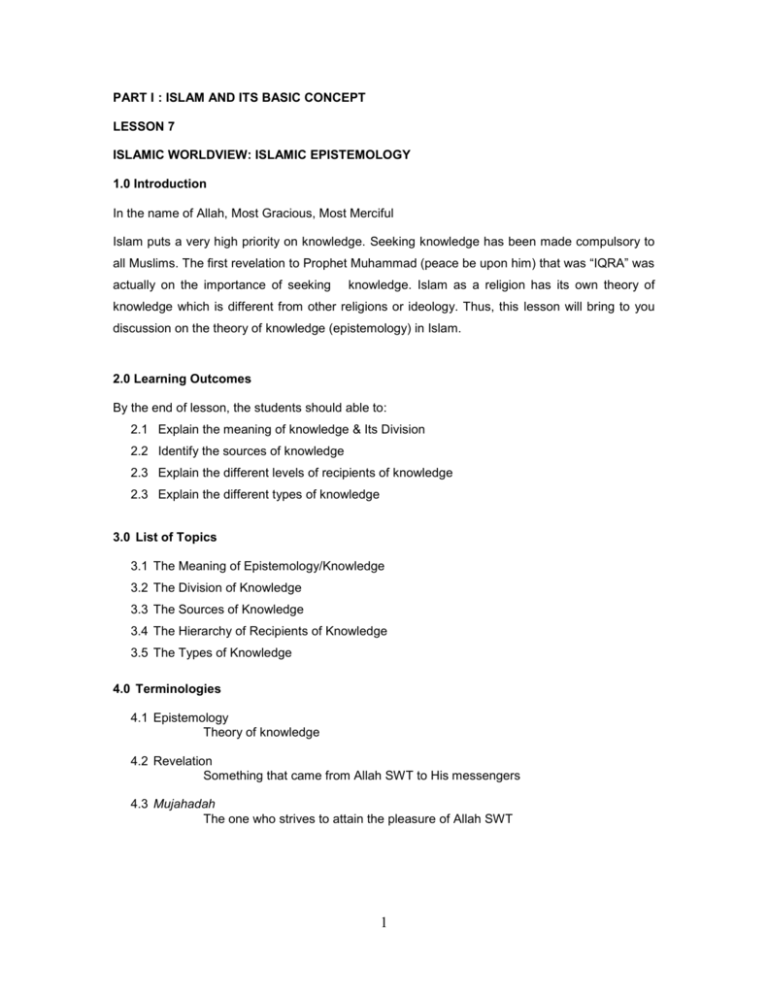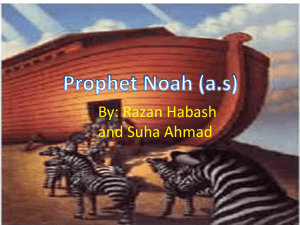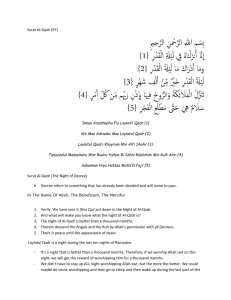LESSON 1
advertisement

PART I : ISLAM AND ITS BASIC CONCEPT LESSON 7 ISLAMIC WORLDVIEW: ISLAMIC EPISTEMOLOGY 1.0 Introduction In the name of Allah, Most Gracious, Most Merciful Islam puts a very high priority on knowledge. Seeking knowledge has been made compulsory to all Muslims. The first revelation to Prophet Muhammad (peace be upon him) that was “IQRA” was actually on the importance of seeking knowledge. Islam as a religion has its own theory of knowledge which is different from other religions or ideology. Thus, this lesson will bring to you discussion on the theory of knowledge (epistemology) in Islam. 2.0 Learning Outcomes By the end of lesson, the students should able to: 2.1 Explain the meaning of knowledge & Its Division 2.2 Identify the sources of knowledge 2.3 Explain the different levels of recipients of knowledge 2.3 Explain the different types of knowledge 3.0 List of Topics 3.1 The Meaning of Epistemology/Knowledge 3.2 The Division of Knowledge 3.3 The Sources of Knowledge 3.4 The Hierarchy of Recipients of Knowledge 3.5 The Types of Knowledge 4.0 Terminologies 4.1 Epistemology Theory of knowledge 4.2 Revelation Something that came from Allah SWT to His messengers 4.3 Mujahadah The one who strives to attain the pleasure of Allah SWT 1 5.0 Topics 5.1 The Meaning and Concept of Islamic Epistemology (Knowledge) 5.3.1 Presentation Have you ever heard the word ‘epistemology’? If you haven’t, let’s look and understand the meaning of epistemology. The word is derived from a Greek word, “episteme” which means knowledge and “logos” which means theory or study. Thus, epistemology means the theory of knowledge. This theory discusses the origin of knowledge, classification of knowledge as well as human experience, the nature, source and limits of human knowledge, the concept of truth, belief and knowledge. Then, what is knowledge (‘ilm) from Islamic point of view? Literally it means to know (Arabic word is "‘alima"), to be aware of, and to be familiar or acquainted with. Knowledge is a simple term means a thing that a person knows or a fact, information, or a skill and understanding which can be acquired through experience. Technically, ‘ilm refers to the realization of something according to its true nature. According to Syed Naquib al-Attas, ‘ilm is the reaching of a meaning within a human being. What does it mean? It means, knowledge is the human understanding which is based on revelation, observation, research, test, experience and others. In western world view, the element of “revelation” is excluded from the definition of epistemology. Islamic epistemology reflects the reality of life. Thus, it is not philosophical in nature but also a response to all the matters relating to human life, family, society and nation that includes the life in this world and the Hereafter. The theory puts boundaries or limitations on what a Muslim should know, what can be known and what are beyond his knowledge. 5.1.2 Activities Can you list down what a Muslim should know, what can be known and what are beyond his knowledge? Discuss with your friends. 5.2 Division of Knowledge 5.2.1 Presentation Do you know the division of knowledge in Islam? In general, knowledge is divided into two divisions. They are: a) Revealed (naqli) Knowledge It refers to knowledge founded in Al-Quran and Al-hadith. 2 b) Worldly (‘aqli) Knowledge It refers to knowledge which is gained for the worldly purpose such as science, 5.2.2 mathematics, history, geography and others. Activities Can you list down what kind of knowledge can be categorized revealed and worldly knowledge? 5.3 The Sources of Knowledge 5.3.1 Presentation In Islam, we must believe that all knowledge belongs to Allah SWT, be it the revealed or worldly knowledge. The source of all human knowledge is Allah (s.w.t.). Man has the potential to know but he cannot know everything, only Allah can, so He is the Allknowing. Allah has given man knowledge of things through revelation (messages, the final message being the Qur’an), Ilham (Divine inspiration), intuition (sudden inner conviction), intelligence (using man’s brain), and the senses (instinct). a) Revelation ()وحي It is the source of all knowledge in which it comes from Allah SWT to His messengers. His messengers then delivered the knowledge to mankind. The revelations are the source of knowledge pertaining divinity, aqidah, shari’ah, ahklaq, ibadah, stories and others. The revelations were sent to His messengers in many ways. (i) True Dream ()الرؤيا الصالحة Rasulullah (peace be upon him) once had received revelation in a true dream in which he saw something like the light at the break of dawn coming towards him. It is narrated by al-Bukhari and Muslim from Aishah R.A. (ii) To the Heart of Messengers Angel Jibril a.s putting revelation in the Prophet’s heart without others noticed the coming of the angel. It can only be heard like a bell ringing. (iii) Angel Jibril a.s appears in the form of a human being The angel used to came to Prophet Muhammad SAW in the form of human being and talked to the Prophet SAW. Umar al-Khattab R.A had reported 3 that one day, while they sat together with Rasulullah SAW, suddenly a man all in white whom nobody recognized, approached Rasulullah SAW, sat in front Rasulullah SAW until his knees touched the Prophets’s SAW knees, then he put his hands on the Prophet’s SAW thigh, then asked about Iman Islam and Ihsan. Do you know the hadith? (iv) Direct from Allah SWT to His Messengers This happened to Prophet Muhammad SAW and Musa A.S. in which Allah SWT talked to the prophets behind veil (hijab). For example, Rasulullah SAW received the command to perform the five daily prayers through this way. (v) Angel Jibril a.s came in its original and can be seen Ity happened twice to Rasullah SAW. The first was in Hira’ Cave and the second was at Sidratul Muntaha while the angel accompanied the Prophet Saw during the journey of ‘Isra’ Mi’raj. This is recorded on Surah al-Najm, verse 13-15. b) Ilham (Divine inspiration) Ilham in the context of the discussion of the source of knowledge in Islam is different with the common understanding of the people. By the way, what is inspiration? Inspiration is an emotional perception that comes straight from the heart. Ilham is given by Allah SWT to those who are very close to Him and put much effort in ibadah and mujahadah. Kashf is one type of inspiration. Kashf is the ability to see or know something that other people cannot do unless by learning”. This type of inspiration is normally given by Allah SWT to His servants who are pure both soul and body and keep themself away from doing something forbidden by Allah SWT. It is something supernatural that comes unconsciously from the human heart. Allah SWT honoured them for their effort of getting closer to Allah SWT. c) Intuition (sudden inner conviction) Intuition is an inspiration from the active mind, thought and soul which moves from the start until the end, unconsciously and without a medium. Intuition is receiving input and ideas without knowing exactly how and where you got them from. You simply know it is not from yourself. Like creativity, intuitive inspiration often happens 4 when someone virtually fuses in an activity and highly focused on the respective activity in a state of joy and fulfillment. In other words, intuition is the fast sudden observation towards an event or reality without external stimulus or logical reason. d) Intelligence (using man’s brain) Mind is a special gift from Allah SWT to human beings that makes them different with animals. Through the active exercise of the mind, we can attain intelligence. By using the mind, a person will try to find knowledge from the abundant of the universe by contemplating the sunnatullah (the natural laws set by Allah SWT). There are abundant of knowledge in the sunnatullah that can be discovered by human being through the exercise of an active and healthy mind. Among the examples are: (i) Fire: It has the character of burning something (ii) A specific wood or leaf has the properties to cure a particular disease A medical practitioner will put his effort to know and conduct research to find out a cure or medicine for a particular illness (iii) The air space Scientists have put many efforts to understand the phenomena on the air space, the planets and so on. e) Senses (instinct) This is the lowest form of the source of knowledge in the hierarchy. A normal human being is normally has five senses i.e sight, hearing, smell, taste and touch. The five senses are very useful in receiving information and knowledge. The information received will be transmitted to the mind to be interpreted. Hearing and sight are the two senses that can take much information and knowledge. Allah SWT had mentioned many times in the Holy Quran. For example in Surah al-Isra: 36. Thus, no wonder if the hearing and sight will be questioned in the Hereafter. 5.3.2 Activities Find out the following: a) Hadith that discusses Islam, Iman and Ihsan. Write down its the text and its meaning. Then, try to understand the meaning b) Quranic verse of Surah al-Isra, verse 36. Write it down and try to understand the meaning. 5 5.4 The Hierarchy of Recipients of Knowledge 5.4.1 Presentation Do we receive knowledge other than from Allah SWT? Of course not, is it right? Everyone receives knowledge from Allah SWT, be it Muslim or non-Muslims or even those who do not believe in the existence of God. This is the fact that all Muslims must believe in. However, the recipients of knowledge are different between one group and another. There is a hierarchy of the knowledge recipients as illustrated in the chart below: ALLAH SWT The Knowledge Giver -------------------------------------------------------------------------------------------------- 1 Prophets and Messengers, who received the revelations 2 Awliya’ Those who are gifted men, who have reached great intimacy with Allah) receive ilham (inspiration = know things others don’t) 3 Ulama’ and hukama Those given knowledge and given wisdom and understanding. They are the scholars and intellectual. 4 The Public The civiliants. Those received knowledge imparted by the early prophets and messengers, Awliya’, Ulama’ and Hukama’. 5.4.2 Activities a) Can you list down as many as names of the following awliya’ that you know. Then, write a brief background of each of them. b) Can you identify the differences between Hukama’and ‘Ulama’? 6 5.5 Type of Knowledge 5.3.1 Presentation From the discussion above, can you identify the types of knowledge? In general, knowledge in Islam is divided into three types i.e Revealed Knowledge, Inspirational Knowledge and Empirical Knowledge. Revealed Knowledge This knowledge is based on revelations such as the Quran and Hadith. It is also known as shari’ah, naqli or religious knowledge. All Muslims are compulsory to learn this knowledge. It is the first knowledge that must be learnt by all Muslims. It is the knowledge about Islamic teachings. Inspirational Knowledge This knowledge needs not to be learnt. It does not require the use of mind to think and learn. It is different with revelation that was revealed to messengers of Allah SWT but similar in the sense that the knowledge goes directly to the human heart without learning. It is given by Allah SWT directly to a chosen or selected group of people who have great intimacy with Allah SWT. This group of people always do mujahadah and performing ibadah to get very close to Allah SWT. Among the type knowledge under this category is kashf ( )كشفand ladunni ()لدني. Empirical Knowledge It is knowledge that based on facts and is attained through human physical senses. It includes science, geography, astronomy, mathematics and others. The basis of this type of knowledge is the ability to think, conduct analysis and make conclusions on facts which are gathered. Even though the human can use their minds to think, analyze and make conclusion on certain facts, it must not contradicting the Islamic teachings. It means, when defining facts or findings, we must always relate them with the existence of Allah SWT. That is why, Islam does not recognize the ‘Theory of Evolution” of Darwinisme that claims human was originated from ape because it is clearly stated in the Holy Quran that Allah SWT is the one who created man from the soil. Empirical knowledge, be how great its findings, if against the Islamic teachings is 7 rejected by Islam and not considered as knowledge. In fact, it is categorized as blameworthy knowledge. By the way, what is blameworthy knowledge? It is the knowledge of something that is harmful to one’s self and to others (knowledge on how to commit the perfect murder, how to steal, how to produce drugs, how to practice black magic, etc). Such knowledge is not only a sin to be learnt (by study or practice) but also forbidden to taught to others. 5.3.2 Activities a) List down the type of knowledge under revealed knowledge. b) Describe in general what kind of knowledge can be attained from the revealed knowledge. c) What is ladunni knowledge? Is there any different with kashf? d) List down ten examples of blameworthy knowledge? 6.0 Lesson Summary From the discussion above, we know that epistemology is the theory of knowledge that discusses about the sources of knowledge, its classifications and also human experience. Islam puts a very great importance on seeking knowledge in which it has made it compulsory to all Muslims with the priority given to the seeking of the revealed. Beside the revealed knowledge, Islam also gives a great emphasis on the use of mind to attain knowledge by observing the sunnatullah (natural phenomena) as long as the findings from the observation do not against the Islamic teachings. Any findings that contradicting the Islamic teachings are not considered as knowledge. 7.0 Self Assessment 1. Literally knowledge means to __________ A. believe B. accept C. know D. achieve Answer: C 8 2. Technically, ‘ilm can be understood as _________ A. a fact B. an experience C. a skill D. beneficial information Answer: A 3. The first source of knowledge is ___________ A. revelation B. intuition C. Ilham D. intelligence Answer: A 4. The lowest receiver of knowledge is _____________ A. prophet B messenger C. scholar, expert D. the average man and woman Answer: D 5. Which one of these statements correctly shows that knowledge is achieved through intelligence? A B C D Getting a new idea after observation The prophet received revelation from God The messenger knew what was going to happened Getting high scores after doing a lot of reading and research Answer: D 6. Intuition is different from revelation because it ___________ A comes from Allah B needs an active mind C requires a lot of earnest practice D requires the observation of five senses Answer: C 7. Which one of the following is CORRECT? A B C D SOURCES Intelligence Revelation Sense Ilham EXAMPLES A man reads a lot of novels A man sees the prophet in a dream A man gets information from what he sees A man got the best ideas while he is in the toilet Answer: C 9 9. Based on the hierarchy of receivers of knowledge in Islam, the public can upgrade their level by ___________ A B C D having dream reciting al-Qur’an doing meditation at the secret place acquiring information and education Answer: D 10. Empirical knowledge is different from gifted knowledge because it __________ A is gained by nature B is revealed by Allah C is received through dreams D requires man’s effort of learning Answer: D 11 Which one of the followings is correct? Answer A B C D Receivers Public Hukama' Messengers Ulama' Methods of acquiring knowledge Having dreams Reading and doing research Receiving ilham from the prophet Receiving information through meditation Answer: B 12 Revelation in a form of ilham is revealed to _________ A B C D public ulama' hukama' messengers of Allah Answer: D 13 Hukama’ and ulama' share the similarity in the sense that they are __________ A B C D gaining information through angel JInril a.s acquiring knowledge from the public receiving knowledge through dreams acquiring knowledge through learning Answer: D 10









